The police force has refused to disclose a copy of the internal regulations, known as Standing Orders, which specify the way in which officers must use their body cameras when dealing with the public, with a spokesperson saying that the force’s policies are “internal documents”.
The force has previously stated that body cameras, known also as Body-Worn Cameras (BWCs), which have been deployed by the police force since they were announced in May of this year, are supposed to be worn by officers at all times when dealing with the public, with an In-Field Tech department that oversees the footage.
After The Shift published an article a week ago questioning who exactly within the force has access to the footage recorded by BWCs, a spokesperson for the force later added that the In-Field Tech department is made up of four officers under the direct charge of an inspector.
When questions were sent about whether the force has signed an agreement with Amazon, the server provider for the police’s internal BWC system, to preclude Amazon from sharing data with third parties, the spokesperson said that “the project underwent a Data Protection Impact Assessment and was eventually given the greenlight from the IDPC (data protection commissioner)”.
Since then, The Shift has contacted the office of the data protection commissioner to ask for a copy of the impact assessment that it has compiled.
The police’s spokesperson also added that BWCs cannot be used to “purposely record any personal activity of third parties” as in doing so an officer would be liable to disciplinary actions.
However, given that no legislation has been published and the regulations on body cameras are internal policies that are not yet public, it is not known what such disciplinary actions would consist of. An academic analysis of 30 BWC use studies across the US had indicated that a majority of the research failed to determine any credible results in terms of improved policing.
The Shift had asked former European Court of Human Rights Judge Giovanni Bonello to assess the force’s decision to regulate the use of BWCs using a Standing Order rather than legislation. Bonello said that the possibility of infringing on a citizen’s privacy should be “expressly authorised by law”.
The police’s spokesperson also said that access to the footage is limited solely to In-Field Tech officers and that requests for viewing can only occur under specific circumstances. Any footage that is not needed for court or internal disciplinary action is deleted automatically after 90 days.
The force also clarified its definition of a Crime of a Sensitive Nature, explaining that “normally, it is one which affects the dignity of the person, such as an independently exposed victim or a similar scenario”.
When asked whether the force had discussed any internal concerns relating to the possibility of officers turning on their cameras even in such situations that may affect the dignity of a person to ensure they do not face disciplinary action, no clear answer was provided.
During a press conference in which home affairs minister Byron Camilleri and police commissioner Angelo Gafa’ referred to Eurobarometer statistics which outlined that trust in the force had risen by 11%, Camilleri has repeatedly referred to BWCs as a way of increasing the force’s accountability and the public’s trust.
While studies in other countries have mainly managed to show that there is usually a statistically significant decrease in reports on bad police conduct when BWCs are deployed, improvement in terms of accountability or public trust was not detected on a consistent basis.
It is not known what research the government has consulted before deploying BWCs in the police force. It is also unclear how the In-Field Tech Unit would be able to detect when officers fail to switch on their cameras since the camera does not automatically keep recorded footage unless the officer switches it.
Such a scenario could prove particularly problematic in situations in which police officers deviate from standard procedures or commit criminal acts themselves with no one else to monitor them.
Reported examples of this include a case from 2016 in which an off-duty officer had crashed into a motorcycle on an early morning and fellow officers failed to secure the crime scene adequately, or a 2018 case in which an officer had lied under oath about being injured in a traffic accident which largely seemed to be his own fault, according to the other party in the accident.














Ahjar jaghmlu cameras go Kastilja.
Camera footage should go to an independent body so nobody in the police force can access it or get a friend to access it. It the only way to make sure the footage never gets deleted or tampered with